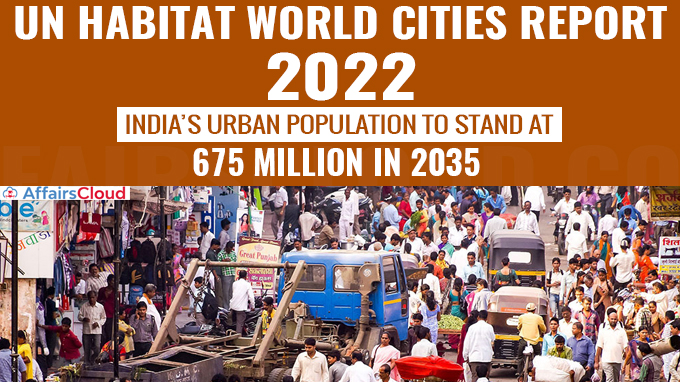
According to the United Nations Human Settlements Programme (UN-Habitat)’s “World Cities Report 2022: Envisaging the Future of Cities seeks”, India’s urban population is estimated to rise to around 675 million in 2035 and become the 2nd highest country following China’s 1 billion.
- The report stated that the rapid urbanisation was delayed temporarily due to the COVID-19 pandemic.
- The report highlighted that the growth of the global urban population is back on track by another 2.2 billion people by 2050.
Note:
- The main objective of the World Cities Report series is “The study of urban development”. The maiden edition of World Cities Report was published in 2016.
- The report merging the State of the World Cities Report and the Global Report on Human Settlements, highlights the new forms of collaboration and cooperation, planning, governance, finance and learning that can sustain positive change.
India’s urban population:
i.The report has estimated that India’s urban population will reach 675,456,000 in 2035 increasing from 483,099,000 in 2020 to 542,743,000 in 2025 and 607,342,000 in 2030.
ii.By 2035, the percentage of population in India at mid-year residing in urban area will be 43.2%.
Key Points:
i.According to the report, China’s urban population is expected to be around 1.05 billion by 2035 while the urban population of Asia is projected to be around 2.99 billion in 2035.
ii.The report stated that, large economies such as China and India have a large share of the world’s population and the development trajectories of these countries have greatly influenced the global inequality.
i.Over the past 2 decades, India and China have experienced a rapid economic growth and urbanisation. This led to the reduction in the number of people living in poverty.
ii.The urban population is projected to increase from 56% of the global total in 2021 to 68% by 2050.
iii.The report highlighted that tackling urban poverty and inequality is one of the key priorities of the policy makers for building an inclusive and equitable urban futures.
Impacts of Climate Change:
i.The report noted that the cities(particulary the cities in warm climate or low lying coastal area) experience existential threats due to the risks and impacts of climate change and extreme weather events such as increased heatwaves in Delhi, India, and the pervasive flooding in Jakarta, Indonesia, and Durban, South Africa.
ii.The lockdown and mobility restrictions imposed globally due to the pandemic, has resulted in a major improvement in air and water quality.
iii.Several sites in the developing countries have reported an unprecedented reductions in the level of airborne pollutants such as particulate matter (PM2.5), PM10, Carbon dioxide CO2, Nitrogen dioxide NO2 and Sulfur dioxide SO2.
iv.Owing to the absence of safe, affordable and reliable public transportation systems, the dependency of private motorise vehicles increased during the pandemic. This could increase the challenging issues like air pollution, congestion and road safety.
Urbanisation:
i.The reporte noted that globally the urban extension has surpassed urban population growth. Due to this expansion, several cities have grown beyond the boundaries of their central municipality.
ii.Smart cities have become popular catchpharase and major policy paradigm for technology-driven urban innovation and development.
iii.To provide strategic and programmatic direction for urban development, several municipal administration has adopted the smart citi agenda.
Highlights:
The report highlighted that the most progressive forms of empowerment of women often come from civil society. The self-help organisation “Kudumbashree” of Kerala has more than 4 million female members and played an instrumental role in removing absolute poverty from the state.
About United Nations Human Settlements Programme (UN-Habitat):
Executive Director– Maimunah Mohd Sharif
Headquarters– Nairobi, Kenya




